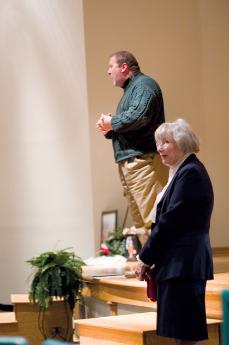Joan of Arc story found as more religion than military ambitions

Dr. Jim Lile (left), associate professor of theatre, introduces Dr. Felicia Londré, Curators’ professor of theatre at the University of Missouri-Kansas City, at her lecture “Jeanne d’Arc and Jean Anouilh in French Theatrical Tradition” Oct. 13 in Webster Hall auditorium.
From the perspective of one France Semester speaker, the story of Joan of Arc becomes a list of plays in “Jeanne d’Arc and Jean Anouilh in French Theatrical Tradition” Oct. 13 in Webster Hall auditorium.
“Jeanne d’Arc began with writers’ plays, paintings, songs (and) stories as military history almost immediately after her death not only in France but our country and in our contemporary era,” said Dr. Felicia Londré, Curators’ professor of theatre at the University of Missouri-Kansas City, honorary co-founder of the Heart of America Shakespeare Festival and dramaturge for the Nebraska Shakespeare Festival and Kansas City Actors Theatre.
Londré said because of all the plays about Joan of Arc, she has developed a theory about playwrights.
“It seems to me that any playwright who continues writing long enough will eventually write a play about either Don Juan or Faust or Joan of Arc,” she said.
Londré said the problem with the plays about Joan of Arc across the centuries are they are about her military exploits especially the siege of Orléans, which happened on May 8, 1429.
“Even Jean Anouilh’s play about Joan of Arc L’Alouette (The Lark) is not terribly strong on the religion that is the spiritual component,” she said.
During the lecture, Londré said the plays are not always about the sacred.
“Instead Jeanne d’Arc has probably most often been represented as a symbol of patriotic pride and national purpose,” she said. “In the United States in recent decades, she seems to have been appropriated by feminists.”
Joan of Arc was burned at the stake in Rouen, France, in 1431.
“Only four years later came the first play about her,” Londré said.
Londré said Mystère du Siège d’Orléans was performed in Orléans in 1435 with a cast of 100.
“(It) focused on military, but it did have a spiritual component with actors playing the Virgin Mary (and) St. Michael,” she said.
Later in the lecture, Londré said L’Alouette premiered Oct. 14, 1953.
“(It was a) retelling of childhood to death in chronological order,” she said.
In L’Alouette, Londré said Anouilh was not bound to historical accuracy. When the play begins, she said it is already at the trial of Joan of Arc.
“At first the past is predominant, but the intervals in the past become shorter and there are strongly theatrical moments when the past and the present are superimposed,” she said.
Londré said Anouilh was born in Bordeaux in 1910 and worked for Honoré de Balzac from 1938-1948.
“Balzac wrote Anouilh was one young fervent person between the world wars, a generation of romantic order and a touch of wildness and more important a dream of purity,” she said.
Your donation will support the student journalists of Missouri Southern State University. Your contribution will allow us to purchase equipment and cover our annual website hosting costs.



























